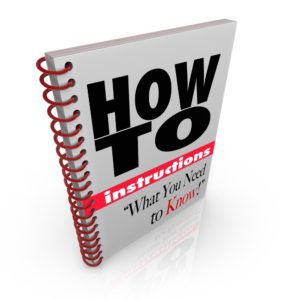By Rose O. Sherman, EdD, RN, NEA-BC, FAAN
 I recently read an interesting blog post by Julie Zhuo on the leadership idea of creating a How to Work with Me manual. I wondered if new graduates would find such a manual helpful so I took an informal sample and asked the question. It turns out that most really liked the idea of having more information about what is important to their manager, how to build trust, their communication style and other key items that Zhou suggests. Most nurse managers today have spans of control that exceed 60+ nursing staff. It is almost impossible to quickly create trusting relationships. The more staff know about you as a person, the better they can understand your unique style of management. Creating a user manual also requires that you reflect on your leadership practices. The act of writing things down helps you to clarify what you value. Zhou suggests the following items could be included in the user’s guide.
I recently read an interesting blog post by Julie Zhuo on the leadership idea of creating a How to Work with Me manual. I wondered if new graduates would find such a manual helpful so I took an informal sample and asked the question. It turns out that most really liked the idea of having more information about what is important to their manager, how to build trust, their communication style and other key items that Zhou suggests. Most nurse managers today have spans of control that exceed 60+ nursing staff. It is almost impossible to quickly create trusting relationships. The more staff know about you as a person, the better they can understand your unique style of management. Creating a user manual also requires that you reflect on your leadership practices. The act of writing things down helps you to clarify what you value. Zhou suggests the following items could be included in the user’s guide.
Contents to a Users Guide to Working with You
Introduction – Provide a little background information about yourself and why you are writing the guide. What are your goals for the manual?
How do I view success – What are the values that underpin your understanding of success. What is your leadership philosophy that drives your management style?
How I communicate – What is your communication style? What are your preferred methods of communication (in person, email, text, phone)? How do you like to conduct staff meetings and what are your expectations around staff participation? Are there any aspects of communication that you are weak in but working on (ex. abrupt in conversations, very direct communicator, too much processing before making a decision)?
Things I do that may annoy you or be misunderstood – What are some of the things about your leadership style that your staff may misunderstand or your quirks that could unintentionally annoy a different personality type (ex. are you introverted, do you dislike small talk, do you like to know about your staff member’s families?)
What gains or loses my trust – What qualities do you value that help build trust? What are the triggers that cause you to lose trust (ex. gossiping, failing to keep commitments, not communicating absences promptly).
What are your strengths – What do you love to do and can help others with (ex. coach staff, teach, de-escalate crisis situations).
What are your blind spots or areas you are working on – If you are working on weaknesses that staff can help you with – let them know (ex. develop more tact, be more timely with feedback, reminders about following up on unit problems).
What are your expectations of staff – What do you consider professional behavior? Do you have expectations of your team that might be different than other managers? What is great customer service from your perspective?
What is your philosophy about giving and receiving feedback – How do you provide coaching and feedback (just in time or on a more scheduled basis)? How should staff give you feedback if there are problems on the unit? What are your expectations around teamwork and conflict resolution?
There may be other items that you wish to include. I think Zhou’s idea is worth trying in nursing. We know that nurse managers are the linchpins in recruiting and retaining staff. A users manual can potentially improve communication and the connection that the staff has with their managers.
Read Rose Sherman’s new book available now – The Nurse Leader Coach: Become the Boss No One Wants to Leave
© emergingrnleader.com 2019


 LinkedIn
LinkedIn Instagram
Instagram